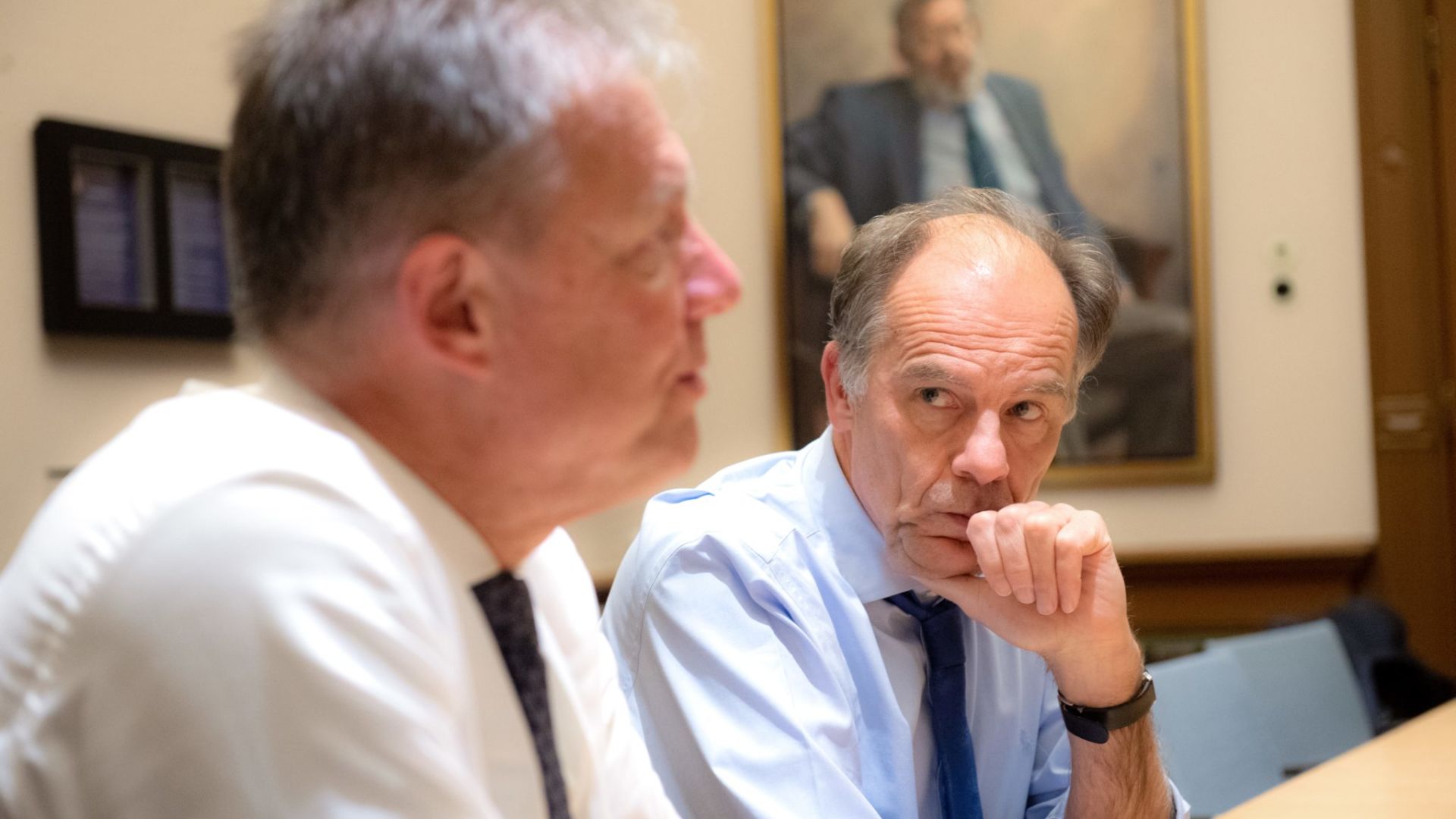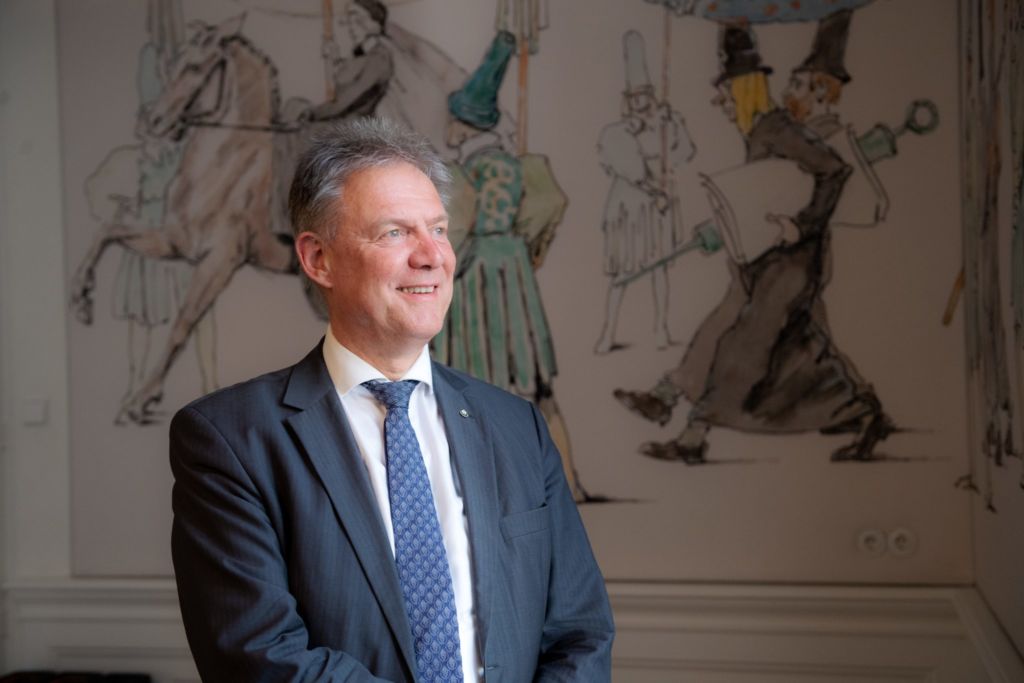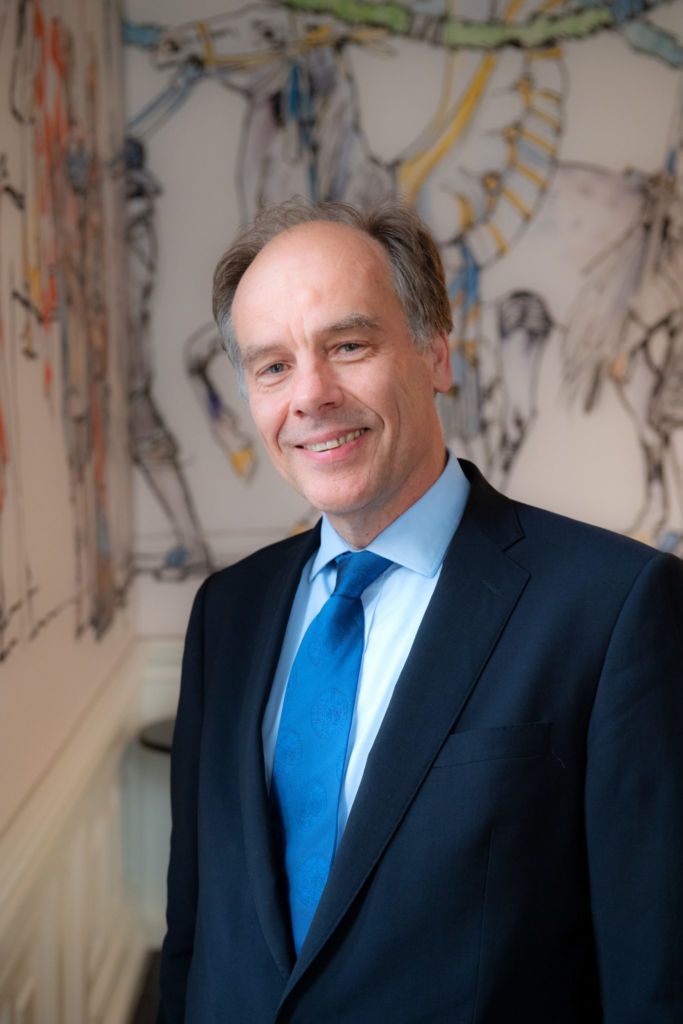Nijmegen versus Leiden: Should a Rector tweet or not?
-
 Han van Krieken (l) en Carel Stolker. Photo: Bert Beelen
Han van Krieken (l) en Carel Stolker. Photo: Bert Beelen
At first glance, Rectors Carel Stolker (Leiden) and Han van Krieken (Nijmegen) don’t seem to have much in common. Stolker sees himself as a champion of free speech, and is not afraid of making his opinions known. His Nijmegen colleague Van Krieken seems more cautious. What are their motives? And where do they find each other? A double interview.
In the Utrecht University Hall, in the shadow of the Dom, Carel Stolker and Han van Krieken have just come out of a three-and-a-half-hour Conference of Rectors. Four times a year, Dutch university Rectors meet to talk – this evening for example about the position of external PhD candidates. Throughout the year, they keep each other up to date through a joint WhatsApp group.
Carel Stolker (1954), Rector of Leiden University, is a ‘Catholic boy’, who’s never tried to hide his membership of the Christian Democratic Appeal Party (CDA). A Professor of Private Law, he’s known as a champion of freedom of opinion. He’s also claimed this freedom for himself: on Twitter, he sometimes reacts faster than his own shadow, even when it comes to tricky topics, such as the pronouncements of former Leiden PhD student Thierry Baudet about the supposedly undermining role of universities in our society.
‘I didn’t feel the need to react to Thierry Baudet’
That other well-known figurehead of the Forum voor Democratie, Dutch Senate Member Paul Cliteur, is a Professor at Leiden University. When some of the University of Groningen staff felt he should not be allowed to speak at their institution, Stolker tweeted: ‘Freedom of speech is the most important pillar of academia.’
Alma Mater
The two years younger Nijmegen Rector Han van Krieken (1956) is no stranger to Leiden University. ‘It’s my Alma Mater. I studied Medicine there.’
And yet, in many ways Van Krieken seems to be Stolker’s antipole. The pathologist keeps his political opinions to himself, and stays as far as possible away from social media. ‘When you shout too loud, all you get is resistance,’ he once told Vox. The Nijmegen Executive Board only responded to Thierry Baudet’s pronouncements after being urged to do so by twelve Nijmegen researchers.
As Rectors, Stolker and Van Krieken are sometimes expected to get involved in the public debate. Because current events force them to, or because they feel called to do so by their researchers.
At the same time, Rectors are also responsible for ensuring that the debate at their own university doesn’t get out of hand. Who gets a podium at the university, and who doesn’t?
Vox: Mr Stolker, you once told Elsevier that Viktor Orbán is in principle welcome to come and speak at your university.
Carel Stolker (CS): ‘Not even in principle. Let’s face it: he’s the leader of an EU country; Prime Minister Mark Rutte also talks to him. I completely disagree with what he stands for, and I think what he’s doing with universities is profoundly wrong (the Central European University in Budapest had to shut down for political reasons, Eds.).’

Han van Krieken (HvK): ‘I don’t have to think twice about Orbán either. He’s certainly welcome. For me, a line is crossed when people call for violence. Take the American preacher who believes murdering homosexuals is a good thing (Steven Anderson, Eds.). Luckily the Dutch government has forbidden him to come to the Netherlands.’
CS: ‘In Leiden, everyone’s welcome on three conditions. First of all, there has to be room for an open debate with serious questions being asked – we don’t do ‘speaker’s corner’, with speakers who only promote their own views without engaging in a debate. Secondly, the opinions expressed must not be in contravention of the law. A person who says homosexuals should burn at the stake is therefore not welcome. Thirdly, physical safety must be guaranteed at all times. This is something we’re always able to do, actually, by hiring enough strong men and women.’
Here’s another case study: the Diederik Stapel affair. The Nijmegen Executive Board (this was before your time, Mr Van Krieken) urgently cautioned the Honours Students Association against inviting him to speak. Mr Stolker, would you have done the same?
CS: ‘No. I find it fascinating how a person like Stapel thinks. But as a Rector, I would have wanted to know the context for the invitation. Was it an interview? Students are great in this respect: they’re very open and find it easy to ask questions. I wouldn’t have forbidden it, but I would have insisted that the debate should be of high quality.’
What about you, Mr Van Krieken?
HvK: ‘It’s a tough one. I asked Gerard Meijer (the then President of the Executive Board in Nijmegen, Eds.) why he had approached the Honours students. He said one of the reasons was that Stapel would have been offered a podium without a serious debate leader. Meijer told the students: think very carefully about whether you want to give this man a podium, but he didn’t forbid it. I would probably have done the same. Incidentally, De Vrije Student had invited Stapel to the Campus on the very same night, so he ended up coming anyway.’
CS: ‘Whatever you do, as a Rector, you’re bound to get things wrong at times. But the alternative is to have the Rector act as moral gatekeeper. And I think that’s a truly threatening situation. Of course we should be careful not to let the university become a channel for certain political groups, but I would mind much more if an administrator took it upon himself to decide who’s welcome. This would cause much more damage than having someone like Jordan Peterson (a Canadian Psychologist who fights against political equality, identity politics, and gender expression, among other things, Eds.) come and speak at your university.’
HvK: ‘Recently, Paul Cliteur was supposed to speak at the University of Groningen, but staff members thought he wasn’t welcome. I was happy that Rector Elmer Sterken said: there’s no way we’re going to exclude him from our university.’
CS: ‘Paul Cliteur teaches at our university every day, ha ha!’
HvK: ‘I was really surprised that Groningen researchers would make such pronouncements. This kind of thing could happen in Nijmegen too, but I would certainly not let the commotion result in the invitation being cancelled.
A while ago, Climate Scientist Heleen de Coninck invited the Sustainability Director of Shell for a lecture. Students were planning to interrupt the lecture by bringing in a gigantic inflatable pipeline. Heleen said: make your statement, then take that thing outside, and come back to engage in a dialogue. I think that’s a good approach.’
CS: ‘Of course. The only function of this kind of action is to get a photograph. Also, in my experience, it’s usually lecturers who want to forbid some speakers from coming, rather than students.’
HvK: ‘In a YouTube video, one of our political philosophers (Mathijs van de Sande, Eds.) explains at an anti-racism demonstration in the city where freedom of opinion comes from. It was originally intended to strengthen the weaker groups in society. According to Van de Sande, this means this freedom is not to be granted to everyone, so for instance not to Geert Wilders or the Forum voor Democratie. I find that a tricky stance.’
CS: ‘That’s because it’s a profoundly wrong stance.’
Another case study: What did you think about Roos Vonk comparing factory farming to the Holocaust? The Radboud University Executive Board called her to account for it.
HvK: ‘In a column in Het Parool Frits Barend asked what we as Radboud University administrators thought of it. I called him and expressed my disapproval of the comparison, which is also what I did in my subsequent conversation with Vonk. It’s not so much that we called her to account for it; nor did we warn or reprimand her. I’m not going to forbid Professors to do something that I think will give them a hard time with the media.’

What would you have done, Mr Stolker?
CS: ‘I vaguely remember the incident. I find it an extremely tasteless comparison, but Vonk is allowed to make it – as a statement it’s not against the law.’
Should the university be an intellectually safe ground, where everyone feels safe to publicly express their opinion? Some people believe the university should be a safe space.
CS: ‘This is a debate at the moment in the US: should you protect your students and staff against non-mainstream opinions? In Leiden, we think not. After all, this is the world they’ll soon be part of. Engage in the debate, or stay away. I’m against the university as a safe space, an academic cuddly wall to huddle close to, safe from the terrible sounds coming from the world outside.’
HvK: ‘A term that’s often mentioned with respect to safe spaces is microaggression: people saying things that may unconsciously come across as aggressive. Now, some people believe we should address this kind of microaggression and decolonise our curriculum. It’s hard to really get the conversation going on this topic. For example, I’m in favour of replacing the word ‘slave’ in our lectures with ‘enslaved’, but then also explaining why this is important. At our Faculty of Arts, lecture hall doors sometimes sport trigger warnings if a lecture includes a topic that may be sensitive, such as the Holocaust. I seriously wonder whether this is a good idea.’
CS: ‘I haven’t seen such warnings in Leiden yet. A Law Professor who returned to the Netherlands after a few years in the US once told me that at some US law schools, people are debating whether it’s still OK to teach about rape in the curriculum, since there may be students in the room who have been raped. A terrible experience, of course, but what’s the alternative? Pretend that rapes don’t happen? Are you allowed to be ‘against’ Europe in a lecture on European law? To what extent can you openly express your opinion about climate denial? These can be very sensitive and complex questions, which I believe we should address in our Basic Teaching Qualification (BKO): how do you teach about politically sensitive and sometimes painful topics in an academic context? It requires a lot of skilfulness on the part of the lecturer.’
Should Rectors respond to Thierry Baudet’s pronouncement that we are being undermined by our universities?
HvK: ‘The Minister of Education responded to it very appropriately. I didn’t feel the need to join the discussion, but when a group of Nijmegen researchers called for a response in Vox, as Members of the Executive Board, we felt we had to take a stance.
So many politicians make pronouncements about topics related to the university. I don’t feel that it’s particularly the Rector’s role to respond to every single one. As far as I’m concerned, we could have left it to the public debate.’
You beg to differ, Mr Stolker?
CS: ‘I actually do believe it to be the Rector’s job. If a public person claims we are an undermining institution without providing arguments to support this, I’ll immediately take stance against it. After all, this touches on the core values of the university.’
HvK: ‘But do you do so as Rector, or as an individual?’
CS: ‘As a Rector: it’s my job to represent the academic community and its values. I’m not going to shout, but I will speak. Which is why after that pronouncement by Baudet, I really wanted to talk to Paul Cliteur. He’s now a Senate Member for Forum voor Democratie, and a member of my university, and I wanted to know what his Party meant with this pronouncement.
Universities play such an important role in society. When someone undermines this kind of institution without proof, they touch on the very foundations of a centuries’ old institution and its crucial significance for our society. I’m not against criticism aimed at the university, but I thought the way Baudet did it was highly inappropriate. Look, in her new book, NRC columnist Rosanne Hertzberger says a lot of our research is worthless. That’s also an undermining statement in a way, but at least she provides arguments for it.’
HvK: ‘But if you keep responding to such statements, aren’t you making them bigger than they are?’
CS: ‘Saying nothing is much worse, Han. It’s not for nothing that we Rectors are figureheads. It’s our job to meet that first wave head on.’
HvK: ‘Isn’t it obvious that I’ll say the universities don’t undermine our society? I thought that pronouncement was given too much attention. Other people say much wiser things, and they don’t get this kind of attention. I find it a pity.’
Mr Stolker, you’re very active on Twitter. Have you ever thought about doing the same, Mr Van Krieken?
HvK: ‘Our spokesman keeps advising me to do so, but it’s not my medium. I think it will cost me a lot of time, and I don’t feel the need for it at all. I’m also not on Facebook. The short messages on Twitter can easily lead to superficial and simplistic responses. That’s why I much prefer to engage in public debate via my columns. These usually get positive responses.’

CS: ‘Some time ago, I unexpectedly ended up in a conversation on Twitter with Mr Eelco Runia (former Associate Professor at the University of Groningen, Eds.) about his latest book, in which he argues against market thinking when it comes to universities. We hold very different opinions on the subject, but it was an interesting discussion. You have to steer clear of the gutter, but Twitter is a fun medium for staying on top of the debate. Of course you have to be careful, since one wrong tweet could mean the end of your career as a Rector. And if you do it for the students, don’t bother: they’re not on Twitter.’
HvK: ‘Our students are all on Jodel (an app that allows anonymous users to post messages that can only be seen by other users within a radius of ten kilometres, Eds.).’
CS: ‘Jodel?’
HvK: ‘It’s popular among Nijmegen students. Not so much in other university cities, I’ve noticed.’
If you get a call from Jeroen Pauw, will you jump on the train to Hilversum?
HvK: ‘As a Rector, I’ve been invited to a couple of preliminary talks for national TV shows, but in the end they didn’t want me in the studio – probably because I’m too nuanced (he laughs). The last time was quite recently, for an item on Anglicisation at Nieuwsuur. ‘Very interesting,’ the editor said, ‘but we’ll go with someone else.’ I did do a one hour interview for the VPRO radio programme Argos recently.’
CS: ‘That’s a good programme. They give you time to explain yourself. I don’t think I’d go to a talk show like Pauw’s. Recently, Rianne Letschert (Rector of Maastricht University, Eds.) was invited by M for an interview on sexual intimidation. They invited her for a different topic, and then out of the blue they produced a tweet about rape she’d never seen. She felt awful, but she did a really good job.’
Mr Stolker, you’ve sometimes said about other Rectors that they’re too much locked in their role as administrators. What did you mean by that?
HvK: ‘I can leave the room if you want (he laughs).’
CS: ‘Actually, I was speaking for myself too. When the Stapel affair was drawing so much attention, I had just recently been appointed Rector. Our reaction frustrated me. We didn’t get any further than ‘how lucky it didn’t happen at our university.’ And when Professors were getting fired in Turkey because of their political opinions, we were also very quiet at first.’
HvK: ‘In Brazil they’re now closing down universities too; this is something we should definitely speak up against. When I was appointed Rector, I gave a speech at the Opening of the Academic Year on the importance of science, and how this notion clashes with the idea that researchers are only ‘putting forward an opinion.’ I like to make my opinions known at these kinds of ceremonial moments.’
CS: ‘Rector is Latin for ‘regulator’, which is an important part of our work, but I also think it’s our job to act as figureheads for the university. People expect us to take a stance on important issues, especially where our own university is concerned. You’ll never see me tell people who to vote for, but I will meddle in any issues that threaten the core values of the university.’



